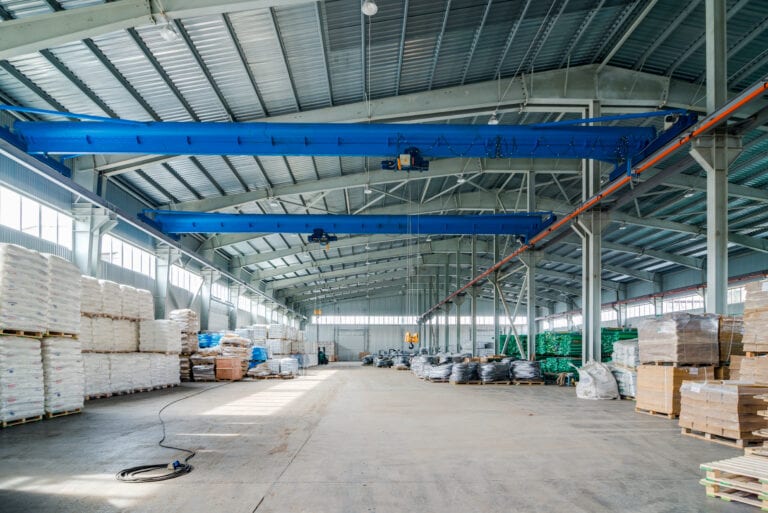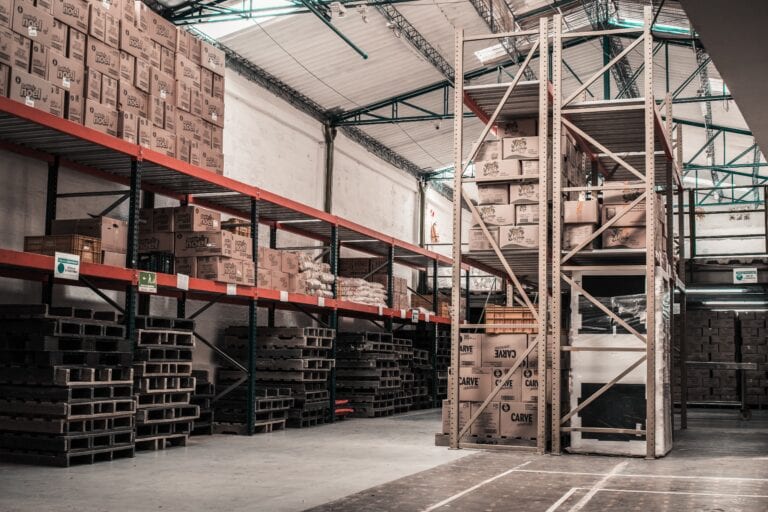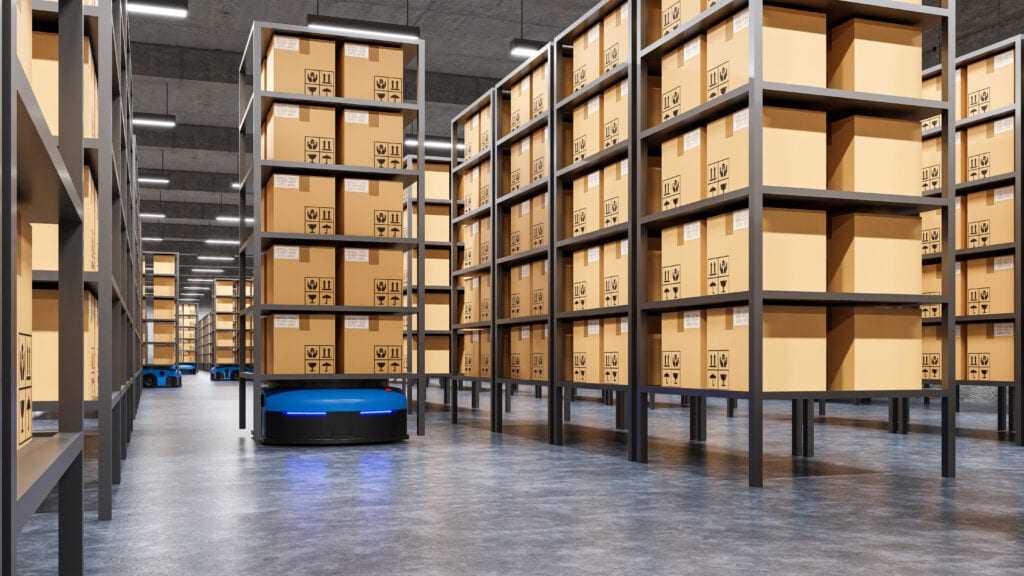Warehouses are an integral part of the supply chain industry. The warehousing and storage industry has grown to a value of 428 billion US dollars in 2020 and is estimated to grow to a market size of over 550 billion US dollars by the end of 2026. Industries like manufacturing, e-commerce, construction, automobiles, agriculture, etc., use warehouses to store raw materials and finished products. Warehouses serve as a collection point for products before distribution.
Primarily, warehouses can be classified into two categories. This classification is based on the scope of services that they can offer –
- Simple Storage Warehouses
This kind of warehouse offers simple storage solutions. It is primarily used by logistics companies, distributors, retailers, and various online vendors. Simple storage warehouses provide a limited range of services wherein the buyer/tenant has to hire and place his employees to manage the warehouse.
- Customized Warehouses
These warehouses offer a more comprehensive range of services as compared to simple storage warehouses. It is primarily used by manufacturing, shipping, packaging, agriculture, and the food and beverage industry. Comparatively, these warehouses are more expensive, and the operational cost is on the higher end. However, they can come out to be cheaper if you’re looking to outsource the management and the spacing to a third-party service provider. The most significant advantage to these warehouses is that they offer flexibility and opportunity to expand operations.
1. The online retailing industry
Over the last few years, the online retail industry has been on the rise. With billions of online customers in the world to satisfy, manufacturers have put production into overdrive. These finished products need a safe and secure place to be stored. That’s where warehouses come into the picture. Other than offering a simple storage solution, warehouses offer a host of other services. Some prominent services include providing a location to centralize the entire process, value addition to the product and the service, economic benefits in terms of higher profit margins, an integrated inventory management system, and an opportunity for the company to monitor quality. Warehouses contribute to making the product affordable and, in turn, increasing the desirability of the product in the consumer market.
Experienced offline shop owners have been capitalizing on the online market by expanding their current warehousing solutions to stock more inventory and compete online. Locally run bookshops, shoe stores, organic vegetable sellers are using the principles of digital marketing to develop their online brand and using warehouses to scale up their operations. Fluctuations in the market demand are a common problem for companies dealing with seasonal commodities. Warehouses help these companies resolve this issue by stockpiling the products for an extended period. Apart from these critical roles played by the warehouse, additional features help companies with flexibility and a possibility for growth in the long run.
2. Distribution Center
A fundamental rule in the traditional supply chain is to “store maximum possible inventory at all times.” Hence, distribution centers are at the heart of the supply chain operation to emphasize the customer-centric business model. The critical facet to the success of the customer-centric business model is customer satisfaction achieved through efficiency and quick delivery times.
Warehouses play a fundamental role in the distribution process. With the growth of e-commerce, companies such as Flipkart, Amazon, and other giants have shown a higher need for warehouses for their product distribution process. In recent years, even small business owners have begun investing in distribution centers as a way to grow and adapt to the trend of online shopping. Keep ahead and learning modern business techniques like online marketing and excellent consumer relations have been instrumental in helping many businesses grow within a matter of months. Warehouses help organizations streamline the distribution process, thereby pushing these companies to achieve their desired goals.
The primary reason for the need for warehouses in the distribution process is to organize the inventory before being dispatched to the consumer. The following substantial reason is that the warehouse serves as a location for sorting and packaging the products to be delivered to the consumers. Warehouses ensure that the distribution process is smooth, efficient and the inventory is safe during the whole process.
3. Fulfillment Centers
Fulfillment centers are warehouses that are stockpiled with products and inventory. Most multinational organizations outsource the responsibilities of the fulfillment center to sub-vendors. These sub-vendors use warehouses as fulfillment centers to offer quick and efficient service to the customers.
The process is quite simple. The MNC contracts the duties of a fulfillment center to a sub-vendor who uses a large warehouse to stockpile the inventory. When a consumer purchases or places an order, the sub-vendor receives and starts processing the order. The product is immediately dispatched from the fulfillment center to the consumer. Warehouses as fulfillment centers drastically reduce the delivery time and help companies maintain a standard of customer satisfaction. Without large warehouses acting as fulfillment centers, it would not be possible for sub-vendors to offer such quick services and deliveries. Companies in the e-commerce sector generally use fulfillment centers.

4. Dedicated storage facilities
Storage is the most basic facility offered by a warehouse. Every product-based company in the world needs warehouses to store its inventory. Manufacturing, healthcare, agriculture, fashion, food & beverage, electronics, and e-commerce are just some prominent industries that use multiple warehouses as storage facilities to meet customer demands in different areas. The duration of storage of the products depends on their nature. Companies choose these warehouses based on various factors such as supplementary storage services offered, location accessibility, and many other factors. The world we know today would not exist without warehouses.
Warehouses provide a safe and secure environment for companies to store, process, package, distribute, and ship their products. A key benefit of warehouses is the vast storage space which promotes mass production of the product.
5. Reverse Logistics
Reverse logistics deals with recycling, repurposing of products, product returns, repairs, and many such activities. Warehouses play a crucial role in reverse logistical operations. The primary industries which require dedicated warehouses for reverse logistics are the healthcare and medical industry. Used products of the medical sector need special consideration and facilities for proper disposal as they are considered extremely dangerous. Warehouses with the ability to provide these facilities are considered ideal. It includes safety precautions, various protocols, refrigeration services, and many similar facilities crucial for efficient and safe waste disposal.
Another primary industry where warehouses play a vital role is the technological industry. It might include the return of products, product recycling, or even the repair of products. Large retailers use warehouses to store the products that have come in repairs and double down on the warehouse by using it as a location to conduct these repairs on the electronics. Recycling electronics is a growing trend because of recent EPR guidelines laid out by the government about managing e-waste. Electronic components and gadgets use expensive materials and even gold during the manufacturing process. Thousands of waste collectors around the world have taken advantage of the circular economy and transformed their businesses into e-waste segregation and processing. Such plants need large warehouses to store and process the inventory for recycling. Moreover, there are multiple government schemes that are promoting waste management activities, making the field even more enticing.
6. Cross-docking centers

Cross-docking is a new methodology in the supply chain industry. In this method, the product is shipped directly by the producer to the consumer without storage solutions. It means a distributor receives a shipment and immediately transfers the load from the inbound transport to the outbound transport. It results in a leaner and more efficient supply chain process. Warehouses are used at two locations during the process depending on the nature of the cross-docking methodology.
The first method is called pre-distribution. It usually happens at the producer or manufacturer’s end. Here the manufacturer holds on to the product for a particular time before shipping it. The products are unloaded from the manufacturing line, packed, and shipped based on a predetermined protocol. Warehouses with unique features, particularly shipping and packaging services, are needed in this to a great extent.
The second method is the post-distribution. In this method, products are sorted after the distribution process and then moved depending on the demand for the product. It is slower than the pre-distribution method. Here warehouses are needed as temporary storage locations until the people involved can decide about moving the product. Warehouses help to reduce the time involved in the entire distribution and shipping process. Flipkart, Amazon, BigBasket, and other vendors use warehouses as cross-docking centers to offer same-day or 1-day delivery services. This method and warehouses are used mainly in the agricultural and perishable products industry.
Conclusion
Warehouses offer a wide range of services to different industries crucial for the growth of the economy and development of the country. The primary goal of warehouses is to help companies provide services of the highest standard. Along with quality control, warehouses have reduced the delivery time drastically and increased efficiency along with profit margins.
The evolving market trends, the introduction of new online ventures, government initiatives have changed the face of the warehouse and supply chain industry for the better. Roles played by these warehouses have evolved and are an integral part of a thriving supply chain. The ready availability of warehouses plays a crucial role in encouraging young entrepreneurs and small business owners to explore, grow and contribute to the wealth generation capabilities of the country.
With the help of the above points, we understand the importance and the critical role warehouses play in ensuring smooth operations for various industries and businesses. Warehouses are crucial for the survival of core sectors such as manufacturing, agriculture, trade, etc. With an increasingly globalized economy, we’re rapidly moving towards a future where high-tech operational warehouses will enable vendors to set up their operations overseas, offering a virtually unlimited scope of expansion.
Related posts
- An introduction to storage methods at warehouses
- 13 Most Important Warehouse Processes
- Warehouse Management System (WMS)
- Everything You Need To Know About A Bonded Warehouse
- 10 Practical Tips To Reduce Warehouse Costs
- 6 Major Benefits Of Bonded Warehouse
- 7 Proven Ways To Improve Your Supply Chain Management (SCM)
- 8 Key Principles of Supply Chain Management (SCM)
- 6 Goals Of Supply Chain Management (SCM)
- What Is Supply Chain Management (SCM)?
- Importance Of Supply Chain Management (SCM)
- The Ultimate Guide To Supply Chain Risk Management
- Top 7 Supply Chain Risk Management Strategies
